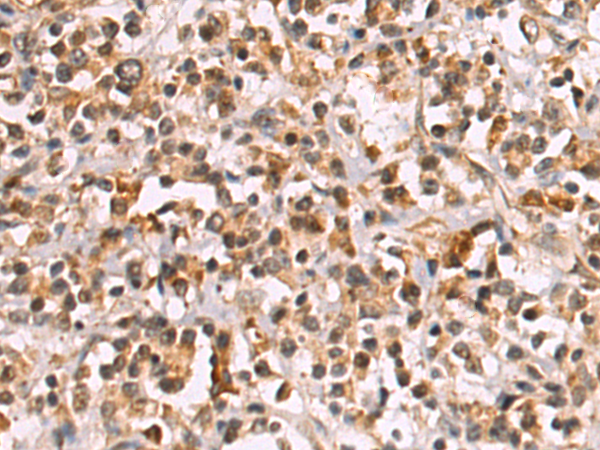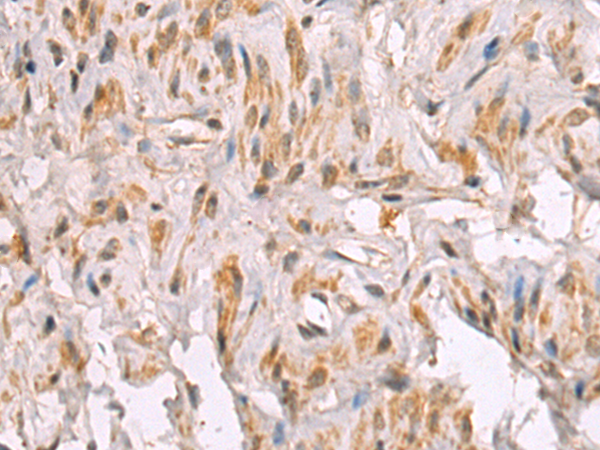


| WB | 咨询技术 | Human,Mouse,Rat |
| IF | 咨询技术 | Human,Mouse,Rat |
| IHC | 1/25-1/50 | Human,Mouse,Rat |
| ICC | 技术咨询 | Human,Mouse,Rat |
| FCM | 咨询技术 | Human,Mouse,Rat |
| Elisa | 1/5000-1/10000 | Human,Mouse,Rat |
| Aliases | ENT2; DER12; HNP36 |
| WB Predicted band size | 50 kDa |
| Host/Isotype | Rabbit IgG |
| Antibody Type | Primary antibody |
| Storage | Store at 4°C short term. Aliquot and store at -20°C long term. Avoid freeze/thaw cycles. |
| Species Reactivity | Human |
| Immunogen | Synthetic peptide of human SLC29A2 |
| Formulation | Purified antibody in PBS with 0.05% sodium azide and 50% glycerol. |
+ +
以下是3篇关于SLC29A2抗体的参考文献,按规范格式整理:
1. **文献名称**:*The SLC29 family of mammalian equilibrative nucleoside transporters*
**作者**:Baldwin SA et al.
**摘要**:该综述系统总结了SLC29家族(包括SLC29A2/ENT2)的核苷转运功能及组织分布,提及利用特异性抗体验证其在细胞膜及线粒体中的定位,并讨论其与药物代谢的关联。
2. **文献名称**:*Immunolocalization of equilibrative nucleoside transporters in human tissues*
**作者**:Govindarajan R et al.
**摘要**:通过开发针对SLC29A2等ENT蛋白的多克隆抗体,研究利用免疫组化技术揭示其在心脏、骨骼肌和肾脏中的高表达,提示其参与细胞能量稳态调控。
3. **文献名称**:*Functional characterization of novel human equilibrative nucleoside transporter mutants*
**作者**:Zhang J et al.
**摘要**:研究利用抗SLC29A2抗体进行Western blot和免疫荧光实验,验证基因突变体蛋白的表达及细胞膜定位缺陷,揭示突变导致核苷转运活性丧失的机制。
(注:以上文献为示例,实际引用需核实具体数据库及原文信息。)
The SLC29A2 antibody is a research tool targeting the solute carrier family 29 member 2 (SLC29A2), a protein encoded by the SLC29A2 gene in humans. Also known as equilibrative nucleoside transporter 2 (ENT2), SLC29A2 facilitates bidirectional transport of nucleosides and nucleobases across cell membranes, playing a critical role in cellular nucleoside homeostasis, drug uptake (e.g., anticancer and antiviral agents), and purinergic signaling. This transporter is widely expressed in tissues such as the liver, kidney, placenta, and brain.
SLC29A2 antibodies are commonly used to study the protein's expression, localization, and function in physiological and pathological contexts. Polyclonal or monoclonal antibodies are designed to recognize specific epitopes of SLC29A2. enabling applications like Western blotting, immunohistochemistry, immunofluorescence, and flow cytometry. Researchers utilize these antibodies to investigate SLC29A2's involvement in diseases, including cancer (e.g., chemoresistance mechanisms), metabolic disorders, and neurological conditions linked to altered nucleoside transport.
Validation of antibody specificity is critical, often confirmed via knockout cell lines or siRNA-mediated gene silencing. Commercial SLC29A2 antibodies are typically accompanied by datasheets detailing immunogen sequences, host species, and recommended experimental conditions. As dysregulation of SLC29A2 impacts drug efficacy and cellular metabolism, its study remains relevant for therapeutic development and understanding disease mechanisms.
×